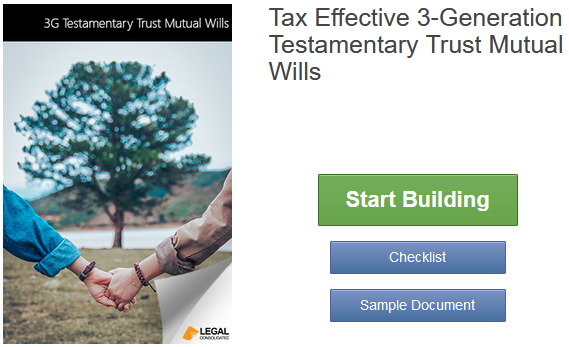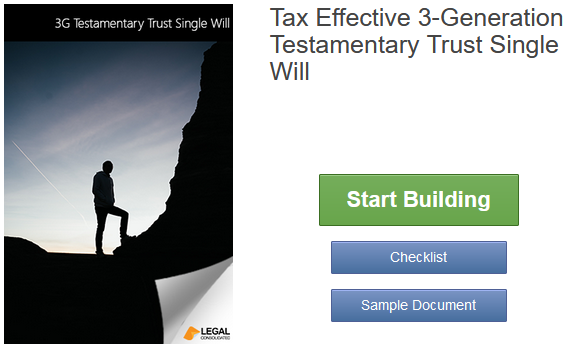Joint tenancy is old fashioned and dangerous
Joint Tenancy vs Tenants in Common
Tenants in common: each owner holds their discrete share of the asset outright. It can be 20% and 80%. Or can be 50% and 50%. Or is can be 34%, 6% and 60%. But it must equal 100%. When a tenant in common dies your interest in the asset goes into your Will. It does not go to the other co-owners.
Joint tenancy: the owners share ownership of the asset equally. It is an ‘undivided interest’. Each owner owns the whole asset. Therefore, if there are two owners they must hold the property 50/50. If there are three owners then it must be a third each. If their interests are unequal then you do not have a joint tenancy. (You would have a Tenancy in Common, instead.)
Together, all owners own 100%. There are no separate interests. At death, the remaining owners take the dead owner’s interest automatically.
In other words, the dead person can not get the joint tenancy asset into his Will. He cannot pass his share of the asset under their Will. This is because it automatically passed to the remaining owners. The last owner to die takes the whole asset.
People often try and leave a joint tenancy asset into their Will. The gift just fails.
ATO treats joint tenancy assets as tenants in common
Under section 108-7 Income Tax Assessment Act 1997, individuals who own a CGT asset as joint tenants are treated as if they each owned a separate CGT asset constituted by an equal interest in the asset and as if each of them held that interest as a tenant in common.
Someone gifts an asset to two people, now what? The Joint Tenancy presumption
Someone gives you and your brother a gift of land. It is 50/50. You die the next day. Does your 50% interest go into your Will? Or does it, via the joint tenancy survivorship rules, go to your brother?
At law there is a presumption that where property is gifted to two or more people, they receive that property as joint tenants. This is subject to any contrary intention.
- Some States’ legislation confirm this outcome. This includes Victoria, Western Australia and South Australia.
- For our example, in Vic, WA and SA your land does not go into your Will. It goes to your brother.
- But New South Wales and Queensland’s legislation creates the opposite position. This means that where real property is gifted to two or more people in those jurisdictions it is deemed to pass to the parties as tenants in common, in equal shares.
- So, in our example, in NSW and QLD the land goes into your Will. Your brother gets no interest in your 50% interest in the land.
Joint tenancy is bad for CGT assets. Tenants in common is better
QUESTION: Why don’t you like assets held as joint tenants? As an accountant, I estimate that 80% of my clients own real estate as joint tenants.
ANSWER: Back before 1980, Death and Probate Duties existed. At that time it was popular for couples to hold assets as Joint Tenants. This meant that when one person died the survivor got the real estate, irrespective of what the Will said. The Joint Tenancy property didn’t go into the Will and therefore Probate Duties were avoided on that real estate.
Death and Probate Duties were abolished by 1981 in all Australian jurisdictions. In 1985, the Treasurer, Paul Keating introduced Capital Gains Tax (CGT). CGT works very differently to Death and Probate Duties. For example, the CGT regime doesn’t recognise Joint Tenancy. For the payment of CGT it treats all property as though it was Tenants in Common. If you own property as Tenants in Common (instead of as Joint Tenants) then when you die your interest in the Real Estate doesn’t go to the survivor. It goes into your Estate. This has additional benefits particularly if your Will has been drafted with tax effective 3-Generation Testamentary Trusts.
CGT punishes joint tenancy
From a tax point of view (only) holding any asset in Joint Tenancy is old fashioned and dangerous – this is particularly the case for investment real-estate. It is best to hold all investment real estate as Tenants in Common. We only practice in the area of tax. Accountants and advisers look at more than just your tax position.
It is generally prudent to own investment properties (these are properties that you may rent out, rather than your family home) as Tenants in Common. The cost to sever Joint Tenancy is not normally high. There is generally no CGT or stamp duty consequences.
For most family homes it probably does not matter. This is because most, but not all, family homes are CGT exempt. Check with your Accountant and Adviser.
CGT and Joint Tenancy
For all other real estate, you suffer Capital Gains Tax. Therefore:
- sever the joint tenancy
- build a Will containing a 3-Generation Testamentary Trust
- when you die your half of the property goes into the 3-Generation Testamentary Trust
- you will pay no or much less CGT when you come to sell that half of the property
If you decide to purchase any real estate in the future then you are welcome to ring me, or any of the solicitors at this firm, to discuss whether your client should purchase that property as Tenants in Common or Joint Tenants.
See here for joint tenancy and bankruptcy.
Can you die at the same time with your spouse?
If I die first my joint tenancy asset goes the survivor. This is my spouse. Or if my spouse dies first I get my spouse’s interest in the joint tenancy asset.
But what if we both die at the same time? For example, in a car accident or from an aeroplane crash. And it is not possible to get the order of death.
In all Australian states the law states the order of death is that the oldest dies first. The order of death is oldest to youngest. The oldest person is deemed to die a second before the younger person.
This means the youngest person gets the joint tenant asset.
See Re Comfort; Re Tinkler; Equity Trustees Executors & Agency Co Ltd v Cameron [1947] VLR 237).
The exception to the ‘oldest is deemed to die first’ rule is South Australia.
South Australian laws are silent on who dies first. There is no legislation in South Australia dealing with this issue.
In South Australia if you die at the same time then your joint tenancy is severed just before the moment of your death. And your interest in the asset goes according to your Will. See In the Estate of Graham William Dawson (Deceased) and Teresa Veronica Dawson (Deceased) [2016] SASC 89.
Strangely, South Australian assets owned as joint tenants pass undivided into the two owners’ respective estates.
Can companies and trust own assets as Joint Tenancy?
Yes. Trusts and companies may own assets with other parties as a joint tenant.
Equity overrides Joint Tenancy
Equity overrides Joint Tenancy. For example, you are married. Your younger wife and you hold a 50% interest each in, say shares in a listed company. This is as Joint Tenants. But your mum gave you the money to buy half of those shares. There is a Declaration of Trust to prove this.
You and your wife now die at the same time. Sure, the shares get transferred to your wife’s estate. But her estate holds your 50% in trust for your mum.
Legally those 50% of the shares are in your dead wife’s estate name. But her estate holds those shares in trust for your mum.
Equity overrides the common law rules of Joint Tenancy.
All trusts rely on equity to enforce the rights of a trust.
Business Partnerships override Joint Tenancy
If the asset is owned as joint tenants but as a partnership asset, then in equity, it is usually owned as tenants in common.
If this deeming rule applies then the death of a partner causes the value of their interest to pass under their Will, and not by survivorship to the other owners.
The Partnership Acts in most States contains the rules. These rules generally state that unless the contrary intention appears, property bought with money belonging to the partnership is deemed bought on account of the partnership and is considered partnership property.
See Spence v FCT [1967] HCA 32:
“It is … a mistake to say she got it simply by virtue of her joint tenancy. The legal estate devolved in accordance with the joint tenancy.
To that extent the maxim which was mentioned – ‘ius accrescendi inter mercatores locum non habet‘ – does not apply: see Lindley on Partnership, 11th ed. (1951), p. 428.
But it is applicable in equity; partners who hold as joint tenants in law hold beneficially as tenants in common.
That is an old rule. [Lake v. Craddock (1732) 3 P Wms 158; 24 ER 1011]
It is more exactly stated today in terms of the Partnership Acts (the relevant provisions are ss. 30 and 32 in the Western Australian Act) the legal estate devolves according to its nature and tenure but in trust so far as necessary for the persons beneficially interested; and as between partners land which is partnership property is to be treated as personal estate.”
Business ownership often severs joint tenancy
The above “us accrescendi” rule is in Latin. (Many good legal maxims are expressed in Latin.) Where ‘merchants’ hold any property in joint tenancy there is no survivorship between them on the death of one. This is for that property. By the seventeenth century the rule is expressed in the form of the maxim: jus accrescendi inter mercatores locum non habet.
But, again, do not rely on archaic Latin expressions that only Professors in tax law and judges love. Instead, expressly sever any joint tenancy.
Legal Consolidated Partnerships sever ‘joint tenancy’
Legal Consolidated Partnership deeds sever ‘joint tenancy’.
Will severs joint tenancy – Gambacorta v Di Giovanni [2021] NSWSC 61
The husband and wife had shares and bank accounts together. Shares held with another person, on the face of it, are held as joint tenants. The same with joint bank accounts.
The wife dies. The husband puts his hand out to take the shares and cash at bank. This is because he is the ‘survivor’ of the joint assets.
The share registry offices and banks all treat the accounts as joint tenants. Both are ready to hand the assets to the husband under the ‘survivorship rule’.
But hang on a minute.
Their Wills left their joint tenancy shares and bank accounts to other people. The husband wants his half to go to a third party. It is the same for the dead wife. The greedy husband knew what his wife wanted. For he had made his Will at the same time with his wife.
Can making a Will sever joint tenancy?
The Judge stated:
“The primary question is whether Maria and Giuliano, by their conduct culminating in wills made by each of them on 2 December 2016, severed the joint tenancy in the joint bank accounts and the shares with the effect that, upon Maria’s death:
-
- half of the funds in the accounts and the shares devolved in accordance with Maria’s will, or
- whether those assets passed to Giuliano by survivorship.”
The Court held that when the husband and wife made their Wills the joint tenancy is ‘severed’. Ownership is turned into ‘tenants in common’. Equity and fairness prevailed. Tenants in common assets go into the Will.
But do not rely on this Court case. The case relates only to New South Wales. Other state courts are not bound to follow this precedent.
Not happy that the ‘survivor’ gets the joint assets? This includes land, home, shares and bank accounts. Then open a new share account and bank account solely in your own name. But most importantly build a Contractual Will Agreement.
Challenging your Will
Is someone going to challenge your Will? If so, then you may wish to leave the property as ‘joint tenants’. If you die first the property goes to the survivor. This is automatic. It does not go into your Will. It, therefore, can not be challenged through your Will. See also:
Who can challenge a Will? Fireproof your Will with a Considered Person Clause
Married man marries sex worker
Superannuation and Rights of survivorship
When paying death benefits from a superannuation fund, the Superannuation Industry (Supervision) Act (SIS Act) and Regulations require that benefits payable on the death of a member are paid to the member’s dependants or legal personal representative (estate). However, when it comes to simultaneous or concurrent deaths, the superannuation law is silent. The States laws determine who is deemed to have died first where a couple die simultaneously or a survivor clause where assets will go to the spouse if he or she survives the deceased after a period.
Consider the superannuation’s trust deed. For example, a member may be in receipt of a pension and their spouse, who is younger, may be nominated to receive a reversionary pension. The member also has a binding death benefit nomination in place which nominates children from another relationship to receive the benefit. In this situation, payment of the death benefit may be determined in accordance with the fund’s trust deed. In some deeds, the death benefit nomination may take precedence over the reversion of the pension. However, if it is silent on which takes precedence, the younger spouse would become entitled to the reversionary pension. Any other benefits of the member would then be distributed under the binding death benefit nomination.




